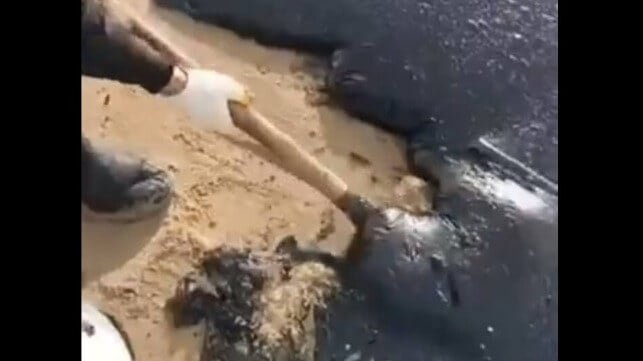The Kerch Strait Oil Spill: Cleanup Efforts Hindered by Stormy Weather
The recent bunker-fuel cleanup operation in the Kerch Strait region faced a setback over the holidays as stormy weather and slow removal of bagged sludge impeded progress. Reports from Russian social media revealed that collected bags of sludge were torn open by wave action, scattering their contents along the waterfront near Anapa.
On December 15, the 50-year-old Russian tanker, Volgoneft 212, broke up near the Kerch Strait, resulting in the spillage of an unknown quantity of bunker fuel, also known as “mazut.” The vessel was carrying 4,300 tonnes of the product at the time of the incident. Additionally, the tanker Volgoneft 239 ran aground in the vicinity and gradually leaked fuel oil over the following days. Combined, the two wrecks resulted in an estimated total volume of 3,700 tonnes of spilled fuel oil, as reported by Russian authorities.
Most of the pollution has washed ashore in the province of Krasnodar, near Anapa. Responders and volunteers have managed to collect approximately 1,700 tonnes of oily sand so far. However, the cleanup efforts have been hampered by a lack of heavy equipment support, leading to the accumulation of bags of oiled sand along the beachfront. A recent heavy storm further exacerbated the situation by scattering hundreds of these bags along the waterfront.
Concerns have been raised regarding the disposal of the collected waste, with reports indicating that some of the bagged waste has not been appropriately dealt with. Videos posted on Russian social media show excavators attempting to bury the bags in the middle of the beach, instead of in a more secure location away from wave action.
Despite the ongoing cleanup operations, volunteers continue to face challenges and frustrations. One volunteer expressed their dismay, stating, “We didn’t come here to clean up fuel oil manually for their praise; we breathe in toxic fumes. We do this to save nature at least a little. In the end, they lie that ‘everything is fine,’ and because of their misinformation, the collected fuel oil is not removed on time.”
Reports of multiple strandings and deaths of threatened Azov dolphins, along with thousands of oiled birds, have further highlighted the environmental impact of the oil spill. With a shift in wind direction, fuel contamination is now drifting towards the Crimean side of the Kerch Strait, raising concerns about potential damage to the Feodosia area.
Environmental activists in Feodosia have voiced their apprehensions, warning that the discharge of fuel oil on their beaches could lead to a more significant disaster than in Anapa due to the unique characteristics of the local sand. Volunteers have already encountered injured birds on the beaches, underscoring the urgency of the cleanup efforts.
Despite the environmental crisis and safety concerns, AIS data reveals that the Volgoneft tanker fleet continues to operate in the Kerch region, further complicating the cleanup and mitigation efforts.

